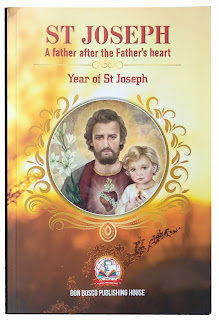Interpreting the Bible (Book review)
Luke H. Grollenberg, Interpreting the Bible, translated by
Jeanne Nooijne and Richard Rutherford, New York: Paulist Press Deus Books,
1968, $ 1.75, pp. 138.
The book is the
written form of 12 discussions on the bible which were aired in 1965 on Dutch
television. The chapters are devoted to exposing a selected theme. Questions of
spectators are interpolated within the body of the presentation. The themes
dealt with are: The Bible, God, God-man relationship, God’s wrath and mercy,
the problem of evil, warnings and threats, the message of Jesus, how the
Gospels were written, understanding the Gospels, the words of Jesus, the
paradise story and truth and fiction.
The first chapter helps us realize the universality of the
bible and its message. The second chapter helps us understand the Jewish
conception of God. The third chapter takes us through the God-man saga: God’s
faithfulness and mercy versus man’s infidelity and arrogance. The fourth
chapter gives us clues to make sense of God’s wrath vis-à-vis the great flood
and the destruction and exile of Israel at the hands of the Babylonians
and Assyrians. The fifth chapter entitled ‘The Problem of Evil’, deals with the
very touchy and pertinent question. Evil was earlier seen as a result of
wrongdoing. God, in his unfailing justice, rewards the good and punishes the
bad, but even the good people suffer. Job is a sterling example of the destructive
power of evil. The doctrine of the afterlife or resurrection helps cope with
evil but does not solve the problem.
Chapter six in titled ‘Warnings and Threats’ which is a
misnomer. The first part of the chapter brings forth insights about God from
the account of Job. The second part of the chapter deals with Jesus’ parable of
the vineyard and the tree that didn’t bear fruit. The seventh chapter gives us
the context in which Jesus preached and the possible reasons for his rejection.
Some of Jesus’ key teachings are presented. The eighth chapter is a teaching on
the origin of the Gospels. The ninth chapter is like a follow-up of the first
chapter. It re-enforces the need to read the bible, particularly the Gospels.
Chapter ten examines a number of Jesus’ words and attempts to interpret their
impact.
The last two chapters were personally, the most interesting.
Chapter eleven dealt with the Paradise story
of Genesis and chapter twelve sifted between the truth and falsity of some
narrations in the bible. These chapters contained novel exegeses and opened my
mind to new ideas. The book is interesting and any curious seeker will find it
helpful. The question-answer method breaks the monotony of explanation and
keeps the reader involved. Fr Luke must be congratulated for this educative and
catechetical work.


Comments
Post a Comment